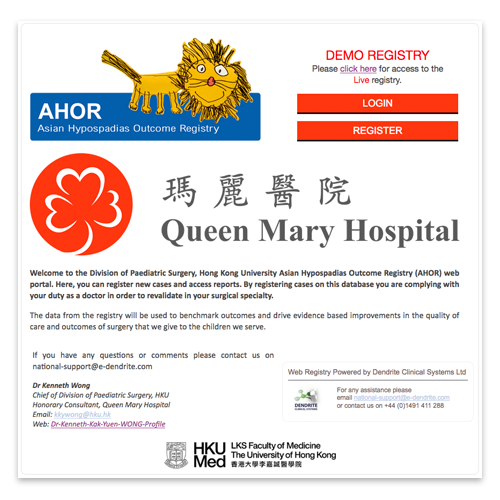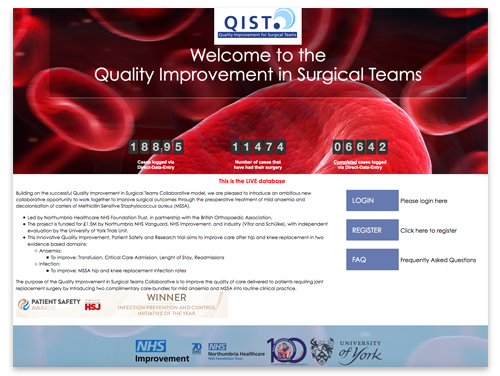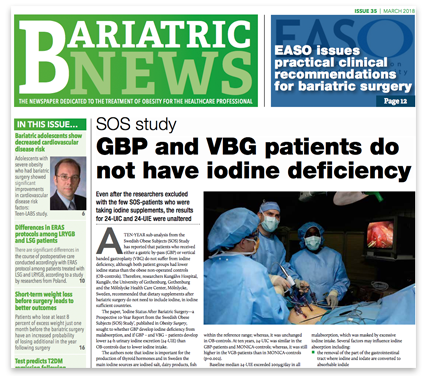Dendrite and Queen Mary Hospital (Hong Kong) launch Asian Hypospadias Outcome Registry
 Dendrite Clinical Systems and the Queen Mary Hospital in Hong Kong have launched the Asian Hypospadias Outcome Registry (AHOR), is a prospective web-based patient registry that will collect, record and analyse the treatment and outcomes of patients undergoing surgical repair.
Dendrite Clinical Systems and the Queen Mary Hospital in Hong Kong have launched the Asian Hypospadias Outcome Registry (AHOR), is a prospective web-based patient registry that will collect, record and analyse the treatment and outcomes of patients undergoing surgical repair.
Hypospadias is one of the most common congenital anomalies in males, in which the opening of the urethra is on the underside of the penis. The condition is typically characterised by proximal displacement of the urethral opening, penile curvature, and a ventrally deficient hooded foreskin. In about 70%, the urethral meatus is located distally on the penile shaft; this is considered a mild form that is not associated with other urogenital deformities. The remaining 30% are proximal and often more complex1. The prevalence is highest in North America, 34.2 per 10,000 births (range 6–129.8) and lowest in Asia, i.e., 0.6–69 per 10,000 births2.
“We are delighted to launch the first hypospadias registry in Asia,” said Dr Peter Walton, Managing Director of Dendrite Clinical Systems. “By collecting and recording data on procedures and outcomes, researchers from the Queen Mary Hospital will be able to determine the most effective treatment for this condition.”
The data from the registry will be used to benchmark outcomes and drive evidence-based improvements in the quality of care and outcomes of surgery. Over time the registry will report on patient demographics, procedure type, length of stay, complications and functional outcomes, as well as improvements in the patients’ quality of life.
To better understand current surgical practice and outcomes in Hong Kong, this online registry was developed by Dendrite using their “Intellect Web” software. This allows users to enter patient data online, using a range of modern html-5 compatible web browsers, without the need to install additional software or perform any complex system configurations. AHOR will initially be a Hong Kong registry, but there are plans to extend the registry to become a pan-Asian Registry.
References
- Duckett JW., Jr Hypospadias. Pediatr Rev. 1989;11:37–42
- Springer A, van den Heijkant M, Baumann S. Worldwide prevalence of hypospadias. J Pediatr Urol. 2016;12(152):e151–e157.
 Dendrite Clinical Systems’ unique and innovation clinical software is been employed for a new innovative Quality Improvement, Patient Safety and Research trial that is seeking to improve the quality of care delivered to patients requiring hip or knee joint replacement surgery by introducing two complimentary care-bundles for mild anaemia and Methicillin Sensitive Staphylococcus aureus (MSSA) into routine clinical practice.
Dendrite Clinical Systems’ unique and innovation clinical software is been employed for a new innovative Quality Improvement, Patient Safety and Research trial that is seeking to improve the quality of care delivered to patients requiring hip or knee joint replacement surgery by introducing two complimentary care-bundles for mild anaemia and Methicillin Sensitive Staphylococcus aureus (MSSA) into routine clinical practice. Dendrite Clinical Systems is to install its “Intellect System” to track outcomes of cardiothoracic surgery at the Cardiothoracic and Vascular Intensive Care and High Dependency Unit, Auckland City Hospital, Auckland, New Zealand. The establishment of a Dendrite system at the unit will improve the quality of data and coding quality by creating effective clinical data entry and reporting, and data validation.
Dendrite Clinical Systems is to install its “Intellect System” to track outcomes of cardiothoracic surgery at the Cardiothoracic and Vascular Intensive Care and High Dependency Unit, Auckland City Hospital, Auckland, New Zealand. The establishment of a Dendrite system at the unit will improve the quality of data and coding quality by creating effective clinical data entry and reporting, and data validation.  Dendrite Clinical Systems and the Society for Cardiothoracic Surgery in the UK are pleased to announce the SCTS Conference News 201 newspaper is now available to view/download. This is the third successive year Dendrite has published the newspaper on behalf of the SCTS. The newspaper reports a multitude of presentations from the meeting including the latest and the best information on new technologies and techniques in cardio-thoracic surgery.
Dendrite Clinical Systems and the Society for Cardiothoracic Surgery in the UK are pleased to announce the SCTS Conference News 201 newspaper is now available to view/download. This is the third successive year Dendrite has published the newspaper on behalf of the SCTS. The newspaper reports a multitude of presentations from the meeting including the latest and the best information on new technologies and techniques in cardio-thoracic surgery.  Dendrite Clinical Systems, the publisher of Bariatric News, is pleased to announce issue 35 of the newspaper is now available to view/download. The newspaper reports on research, technology, events and policy in the bariatric specialty, the latest clinical studies, policy changes and product news, the latest meetings and events, interviews prominent bariatric experts, and host debates between specialists on controversial topics.
Dendrite Clinical Systems, the publisher of Bariatric News, is pleased to announce issue 35 of the newspaper is now available to view/download. The newspaper reports on research, technology, events and policy in the bariatric specialty, the latest clinical studies, policy changes and product news, the latest meetings and events, interviews prominent bariatric experts, and host debates between specialists on controversial topics.


